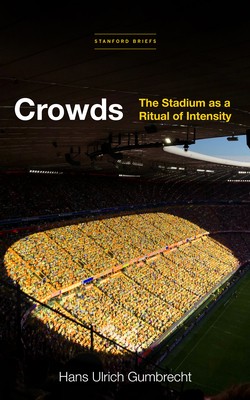
- We will send in 10–14 business days.
- Author: Hans Ulrich Gumbrecht
- Publisher: STANFORD BRIEFS
- ISBN-10: 1503628833
- ISBN-13: 9781503628830
- Format: 12.7 x 20.1 x 0.8 cm, minkšti viršeliai
- Language: English
- SAVE -10% with code: EXTRA
Reviews
Description
Anyone who has ever experienced a sporting event in a large stadium knows the energy that emanates from stands full of fans cheering on their teams. Although the masses have long held a thoroughly bad reputation in politics and culture, literary critic and avid sports fan Hans Ulrich Gumbrecht finds powerful, as yet unexplored reasons to sing the praises of crowds. Drawing on his experiences as a spectator in the stadiums of South America, Germany, and the US, Gumbrecht presents the stadium as a ritual of intensity, thereby offering a different lens through which we might capture and even appreciate the dynamic of the masses.
In presenting this alternate view, Gumbrecht enters into conversation with thinkers who were more critical of the potential of the masses, such as Gustave Le Bon, Friedrich Nietzsche, Sigmund Freud, José Ortega y Gasset, Elias Canetti, Siegfried Kracauer, T. W. Adorno, or Max Horkheimer. A preface explores college crowds as a uniquely specific phenomenon of American culture.
Pairing philosophical rigor with the enthusiasm of a true fan, Gumbrecht writes from the inside and suggests that being part of a crowd opens us up to an experience beyond ourselves.
EXTRA 10 % discount with code: EXTRA
The promotion ends in 23d.12:59:58
The discount code is valid when purchasing from 10 €. Discounts do not stack.
- Author: Hans Ulrich Gumbrecht
- Publisher: STANFORD BRIEFS
- ISBN-10: 1503628833
- ISBN-13: 9781503628830
- Format: 12.7 x 20.1 x 0.8 cm, minkšti viršeliai
- Language: English English
Anyone who has ever experienced a sporting event in a large stadium knows the energy that emanates from stands full of fans cheering on their teams. Although the masses have long held a thoroughly bad reputation in politics and culture, literary critic and avid sports fan Hans Ulrich Gumbrecht finds powerful, as yet unexplored reasons to sing the praises of crowds. Drawing on his experiences as a spectator in the stadiums of South America, Germany, and the US, Gumbrecht presents the stadium as a ritual of intensity, thereby offering a different lens through which we might capture and even appreciate the dynamic of the masses.
In presenting this alternate view, Gumbrecht enters into conversation with thinkers who were more critical of the potential of the masses, such as Gustave Le Bon, Friedrich Nietzsche, Sigmund Freud, José Ortega y Gasset, Elias Canetti, Siegfried Kracauer, T. W. Adorno, or Max Horkheimer. A preface explores college crowds as a uniquely specific phenomenon of American culture.
Pairing philosophical rigor with the enthusiasm of a true fan, Gumbrecht writes from the inside and suggests that being part of a crowd opens us up to an experience beyond ourselves.


Reviews